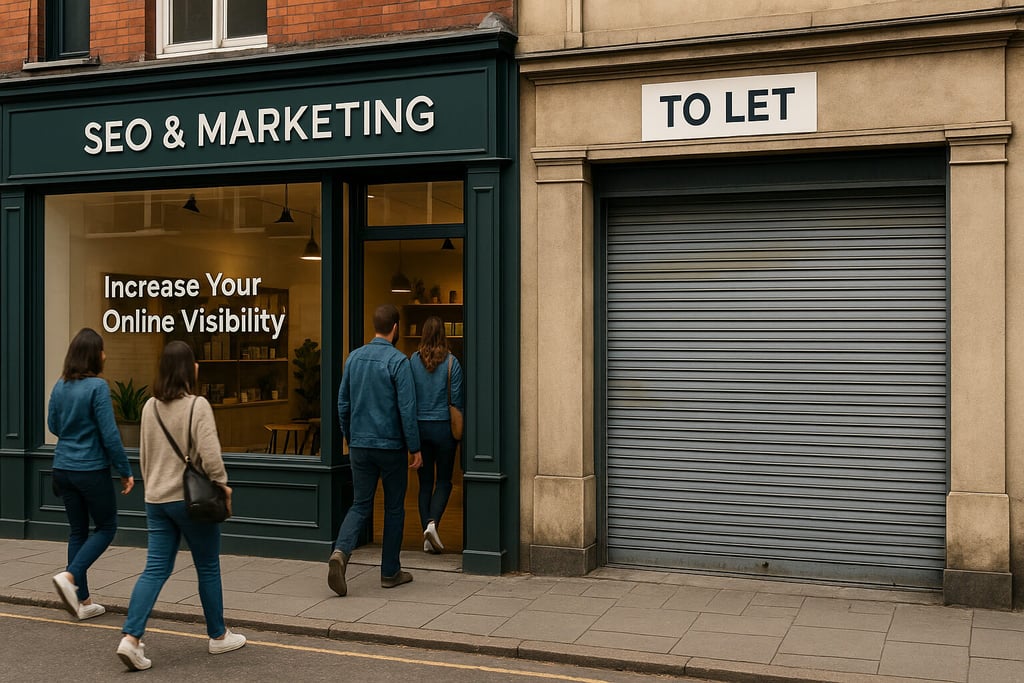SEOJet Flight Blog
Succeed Without SEO? Digital Marketing & Investing In SEO
Succeed without SEO? Explore digital marketing beyond SEO. Learn if you can succeed without digital marketing and how to invest in search engine optimisation.
SEO BASICS
Ardene Stoneman
5/18/20255 min read


Can You Succeed Online Without SEO?
SEO is often seen as optional, especially by businesses investing heavily in paid ads or social media. But can you truly succeed online without SEO? And what happens if you skip it entirely?
This article examines the role of SEO in digital marketing, what you lose without it, and how it connects to user experience, brand building, and long-term traffic.
If you’re wondering whether to invest in SEO or focus elsewhere, this breakdown will help you make an informed decision.
Article Outline
Can digital marketing succeed without SEO?
What happens to your website traffic without SEO?
How does SEO improve user experience?
Is keyword research still important in 2025?
What does SEO do for your brand?
Do you need SEO strategies for local visibility?
Why link building still matters
Can traditional marketing replace SEO?
What are the most effective ways to increase website traffic?
When should you invest in SEO?
1. Can digital marketing succeed without SEO?
You can run a digital marketing campaign without SEO - but it won’t go far. SEO supports almost every other part of your online presence.
Social media, email marketing, and paid ads can get attention, but without SEO, you miss out on organic traffic from search engines.
Most people use search engines to answer questions, compare products, or find services.
If your business isn’t visible in search engine results pages (SERPs), you're relying entirely on push marketing. That’s expensive and not sustainable long term.
SEO isn’t an add-on. It’s part of a complete marketing plan. Without it, your reach is limited, and customer acquisition costs stay high.
2. What happens to your website traffic without SEO?
Without SEO, organic traffic dries up. Your website won't appear in search engine rankings unless users already know your brand and search for it directly.
This creates a dependency on short-term channels like:
Paid ads (which stop delivering the moment you stop spending)
Social media (which has limited reach and high content demands)
Even high-quality website content won’t perform if it's not optimised. Search engines need signals - technical SEO, keyword alignment, and backlink strength - to decide where your site fits in search rankings.
SEO is primarily what helps your site rank higher in search engine results and remain visible over time.
3. How does SEO improve user experience?
Search engines reward a better user experience. Good SEO isn’t just about keywords.
It includes clear navigation, fast loading times, mobile responsiveness, and useful website content - all of which support a positive user experience.
Improving Core Web Vitals, cleaning up structure, and making your site well-structured tells Google your pages are useful. This sends signals to search engines that your site deserves higher ranking.
So while SEO focuses on search visibility, it also supports user experience. The two are connected. Technical SEO ensures your website makes sense to both humans and search engines.
4. Is keyword research still important in 2025?
Yes - keyword research remains one of the most effective ways to increase website traffic.
People still use search queries to solve problems, even with AI-driven search and voice assistants. Understanding how your audience searches and which keywords reflect their intent is critical.
Without it, your content may miss the mark. SEO content based on proper keyword research is more likely to rank highly in search, connect with the right audience, and convert.
It's not about volume anymore - it’s about targeting the right keywords, mapping them to search intent, and matching them with engaging content that delivers answers quickly.
5. What does SEO do for your brand?
SEO helps build brand awareness and drive recognition. When people see your name appearing repeatedly in organic search results, it builds familiarity and trust.
It’s not just about clicks. It’s about presence.
SEO also contributes to your reputation. High-ranking pages show authority. When combined with consistent content marketing and accurate local search listings, SEO supports your brand across multiple fronts.
You can build brand awareness without SEO - but you’ll need to pay for it. SEO gives you visibility in search engine results for free over time. That matters, especially for small or growing businesses.
6. Do you need SEO strategies for local visibility?
If you rely on local customers, local SEO is essential. It’s what helps you show up in local search engine results - like maps, local packs, and regional searches.
Local SEO includes:
Optimising your Google Business Profile
Managing local citations and NAP consistency
Targeting keywords with local intent
Without an SEO strategy here, you won’t appear in local search - even if your product or service is relevant.
If your aim is to attract local customers, you need SEO to support visibility in search engine results pages specific to your area.
7. Why link building still matters
Link building remains a key SEO practice. Backlinks tell search engines your content is trustworthy. They act like referrals from other sites.
Strong backlinks improve your domain authority and help you rank higher. Without link building, even well-optimised pages may struggle to climb SERPs.
Can you get visibility without backlinks? Possibly, but only in very low-competition spaces. Most competitive industries require some level of link acquisition.
Effective SEO includes link building as part of a broader content strategy, targeting the right sources and maintaining quality over quantity.
8. Can traditional marketing replace SEO?
Traditional marketing - print, TV, radio, direct mail - can raise awareness. But it doesn't help with search engine rankings. It doesn’t support organic traffic or improve online visibility.
SEO isn’t just a marketing channel. It underpins how your website is discovered. Traditional marketing lacks that discoverability factor.
Combining marketing strategies is smart. You don’t need to rely on SEO alone. But ignoring it entirely puts more pressure on traditional channels and removes a long-term source of traffic.
To stay competitive, businesses should treat SEO as a permanent part of their marketing efforts.
9. What are the most effective ways to increase website traffic?
There are many ways to increase traffic to your website, but only a few are sustainable:
SEO best practices (keyword targeting, technical optimisation, structured content)
Content marketing (targeted blog posts, landing pages, and FAQs)
Social media marketing (for awareness and referral traffic)
Email marketing (to bring back users and upsell)
Paid ads (for short bursts of visibility)
But SEO stands out because it scales. You can rank for hundreds of search terms from one strong page. It builds momentum that paid and social channels can’t match alone.
SEO helps your content get seen by people already searching - making it one of the most effective ways to increase website visibility over time.
10. When should you invest in SEO?
You don’t have to start with SEO on day one. But delaying too long puts you behind competitors who are already building visibility.
You should invest in SEO when:
Your website has consistent traffic but poor ranking
You’re relying too heavily on paid ads
You’re building a long-term digital asset
You want to build brand trust and awareness
Your site is being outranked by lower-quality competitors
If you're growing a business, want to appear in search engine results, or need more organic traffic - then you need SEO.
Avoiding SEO might feel easier, but the longer you wait, the more difficult it becomes to catch up. SEO isn’t fast, but it’s cumulative. Every day you invest puts you closer to sustainable visibility.
Summary: What to Remember
SEO isn’t optional if you want long-term visibility in search.
Without SEO, you’ll struggle to generate consistent organic traffic.
SEO supports user experience, branding, and local discovery.
Keyword research still matters - so does link building.
Traditional marketing and paid ads won’t replace SEO.
Content needs structure and optimisation to rank.
SEO works best when integrated with your broader marketing plan.
Investing in SEO is essential for building a successful online presence.
SEO helps lower acquisition costs over time.
You can’t rely on social and paid traffic forever - SEO gives you independence.
Want to build real traffic that doesn’t depend on constant ad spend? Talk to SEOJet. We focus on practical SEO that gets results.
Services
Contact Us
Newsletter Signup
sales@seojet.co.uk
01934 289 404
© 2025. All rights reserved.


Locations
Weston-super-Mare
Somerset
Bristol
9am - 6pm, Monday to Friday
Suite 2, Unit 7, 12 Beaufigter Rd, Weston-super-Mare, BS24 8EE
